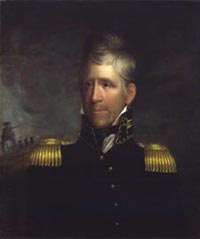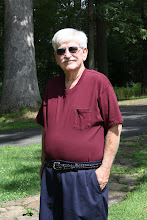
Franklin D. Roosevelt was a blueblood who became afflicted with a terrible disease - Polio. In the process of overcoming his handicap he had to rub shoulders with common people suffering the same affliction. He swam with them, ate with them, suffered and cried with them at the institute he and his wife Eleanor founded in Warm Springs,Georgia. Roosevelt eventually left Warm Springs and launced a 17 year political career that resulted in Roosevelt being our longest serving president during a time when the nation was threatened by the poverty of the Great Depression and the twin evils of Nazi Germany and imperialist Japan. Was Roosevelt a populist? I would say yes only from what he gained from his Warm Springs rehabilitation which lasted for several years i.e. the blueblood New Yorker learned a lot from common people while strapped in his wheelchair in Georgia. His influence on the American Public was immense. He knew what to say and when to say it during a time when America faced situations that could have destroyed her. Our country has been looking for a Roosevelt ever since. But that actually isn't true. The model of the populist president America has been looking for is found in Andrew Jackson. He was our first populist president.
When we hear someone speaking or writing about our "forefathers," they are usually speaking of Jefferson,Washington,Samuel Adams, Benjamin Franklin and others who were there to draft the Declaration of Independence. Don't get upset with me when I tell you these men were not populists or advocates of democracy as we know it. Most would be horrified by today's universal sufferage where everyone over the age of 18 is allowed to vote. These men were enlightened,far-sighted revolutionaries whose vision was of a self-governing democracy which did not share the rich American pie with the British monarchy. If you have ever visited Mount Vernon, our first president's plantation in Northern Virginia, you would be shocked to learn that when he died in 1799, Washington had 316 slaves living on his estate! Don't ever think our "forefathers" were regular "joes" like you and me. Andrew Jackson had absolutely nothing in common with the "forefathers."
He was born in poverty, orphaned young,struggled against the British overlords in his native South Carolina. Taken prisoner at swordpoint at 13 by British dragoons, young Andrew Jackson maintained his dignity and managed to evade the traitorous demands of his captors. After the Revolution, Jackson followed the path of the military and became a militia officer fighting fierce battles with the Indians in the raw American frontier. His toughness got him the nickname "Old Hickory."
The nickname “Old Hickory” has stayed with him, but in 19th century America, Andrew Jackson was commonly known as simply, “The Hero.”Vive Griffith
The United States’ seventh president and the first “everyman” to be elected to our highest office, Jackson was early America’s most vocal champion of democracy. His legacy can be seen every day in contemporary politics—when candidates roll up their sleeves and don hard hats to demonstrate that they are regular folks, when America’s foreign policy heralds the spread of democracy across the planet. Vive Griffith
“Jackson adopted the view that this was going to be a government not simply of the people, but by the people... that there was nothing so difficult about running the country that ordinary people couldn’t figure out and do it. It was a rather unusual notion, but it was the path the U.S. took and the path that we’ve followed until now.” Andrew Jackson, His Life and Times, by H.W. Brands
Washington D.C., prior to Andrew Jackson, had tried to be in tune with the customs of nobility in Europe, there were dress and social codes for every occasion and a penchant for snobbish behavior.
"Jackson's appeal to the American people was the appeal of the chieftan to the tribe. They loved him because he was their protector,their hero. But they also loved him because he embodied their hopes and fears,their passions and prejudices, their insight and their ignorance, better than anyone before him." H.W. Brands
At Jackson's inaugural reception in 1829 the "tribe" of thousands of "common" Americans showed up. Proper and prim Washington D.C. society had never seen anything like it. People wearing homespun clothing and buckskin frills were all over the place celebrating the victory of their hero, the people's populist "everyman" who was "independent" from the wealthy and proper gentlemen who had ruled our small nation until that time.
Wouldn't that be a nice history to revisit in 2009?
Read the best book ever written about populist Andrew Jackson


3 comments:
Andrew Jackson was a genocidist, the American Indians took their legal case from being moved all the way to the supreme court and won but Andrew Jackson told the court that he was going to move the indians west of the mississippi anyway and thousands died in what became known as "Trail of Tears"
Politically correct people frequently try to negate the reality of American history by making comments such as yours. It is arguable as to whether Andrew Jackson was a genocidist or not. Whatever our modern day opinions of Jackson, the fact was that he was the first populist American president and he was beloved by the electorate of his time. You can't make his important place in American history go away by dismissing him with a label. Columbus didn't discover America because he was a "genocidist" as well.
This was the political reality of the time:
"The defenders of the Cherokee were few and mostly far away from Georgia[this refers to the Supreme Court issue]; their persecutors were many and near at hand. Given the racist realities of the time, Jackson was almost certainly correct in contending that for the Cherokees to remain in Georgia risked their extinction. To preserve the Cherokees as a tribe-to enforce Marshall's[Chief Justice U.S. Supreme Court]decison - would have required raising and sending federal troops to Georgia, stationing them there indefinitely, and ordering them to shoot white Georgians who threatened the Indians. Jackson realized that American democracy wouldn't sustain such a policy. It was one thing to threaten to use force to preserve the Union; in such an endeavor he could expect broad support from the people who would actually do the fighting. It was another thing to ask white citizens to risk death protecting Indians. They wouldn't do it. Horace Greeley put words in Jackson's mouth when the New York editor quoted the president as saying, "John Marshall has made his decision; now let him enforce it." Yet the words captured Jackson's attitude. The Chief Justice would have to enforce the decision because no one else would." H.W. Brands, Andrew Jackson: His Life and Times, Anchor Books, 2005
Post a Comment